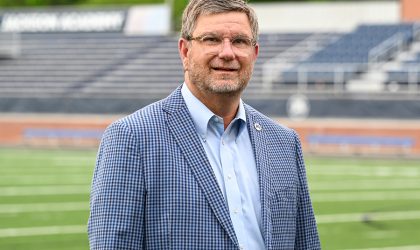When we think of a doctorate degree, we think of the highest degree attainable in an academic field held by a person who is a subject matter expert. The degree holder imparts knowledge to college students, conducts research, and exemplifies critical thinking.
Three faculty members at Jackson Academy have that experience and have chosen to teach in a secondary environment. What does that mean for them and for the students they teach? Get to know our Ph.D.s here:
FOLLOW YOUR HEART…AND THINK CRITICALLY

Teaching an honors college class of university freshmen propelled Dennis Conklin, Ph.D., to the secondary classroom. In fact, out of all the classes he taught, his favorite college teaching experience occurred with this particular group. When Dr. Conklin saw an advertisement for an instructor of history at Jackson Academy, he reasoned that juniors and seniors in a college preparatory school were similar to the honors freshmen he was teaching, and he decided to interview.
“I can’t thank God enough for it,” said Dr. Conklin. “I would never have dreamed I’d be teaching in a high school, but I feel like this is where I belong. I love my job.”
His work at JA is modeled on his college teaching experience. Having taught college freshmen in other classes who were unprepared for higher education, Dr. Conklin is determined to make sure his JA students know what they will encounter.
“College is not about memorization. It is about critical thinking. All my essay questions require students to make an argument and prove it. I want to get them ready to thrive in that environment,” he says.
Adopting an argument and proving it corresponds well with Dr. Conklin’s other previous career—that of the law. Writing briefs in a big law firm left him unfulfilled, so he returned to college to pursue his love—history—and to teach on the college level.
“I firmly believe God puts us on a path to a vocation,” he said. “If you are listening to that inner calling, you are headed in the right direction.”
As a person who changed vocations, Dr. Conklin has perspective. “You’ve got to follow your heart and do what God calls you to do. If you do that, you are going to be happy in a way that none of the material things the world offers will give you.”
He now teaches four sections of eleventh grade U.S. History, a post Civil War elective, and a debate rotation for eighth graders. He is especially eager to begin the spring semester in which students taking the Civil War elective will create web pages on a topic of interest, such as medicine or ancestry.
Dr. Conklin holds both a doctorate and a master’s in history from the University of Southern Mississippi, a Juris Doctor from Loyola University of New Orleans, and a bachelor’s in political science from Blackburn College in Carlinville, Illinois.
THE PERFECT JOB…TEACHERS GET TO KNOW STUDENTS ON A PERSONAL LEVEL

Katharine Todd, Ph.D., planned on a career in education. “Teaching is my chosen career, and I think it’s the perfect job. It’s wonderful to have a career that offers a fresh start each year. Material might be repeated, but the classroom dynamic is never the same,” she said.
Dr. Todd earned a doctorate, a master’s and a bachelor’s degree in English at the University of Mississippi. She taught in the department of English and held administrative roles with the university. Her work experience has included editing narratives for a published work, consulting with students through the university’s writing center, and consulting with students who were preparing to take the Graduate Record Examination (GRE) for admission to graduate school.
At JA, she teaches British Literature, AP Language and Composition, and creative writing, while advising the staff of the literary magazine, Images.
Dr. Todd finds that getting to know students is a special part of her job. “The best part about teaching high school versus college is that you really have time to get to know the students on a personal level,” she said. “Honestly, the only drawback to teaching seniors is that they leave at the end of the year, but I was so touched by how many of my students came back to visit before leaving for college.”
Having experience on the college level helps her prepare students for what college professors will expect and for standardized tests. “I held a teaching fellowship in graduate school at the University of Mississippi, so I was able to gain years of teaching experience on the college level which helped tremendously in preparing me to teach juniors and seniors,” she explained. “It also helps that I know first-hand what college instructors expect from their students, so that’s another great advantage in reaching my goal of preparing students for college-level English courses. Years of experience working in the Writing Center and teaching a GRE prep course at Ole Miss have likewise provided me with knowledge I can pass along to high school students working on personal statements, standardized tests, and other required steps along the path to college.”
In addition to getting to know her students, Dr. Todd also appreciates JA’s environment. “I also enjoy the camaraderie between the faculty members—JA truly has a family atmosphere unlike any other. You feel the “All for One” atmosphere every day—it’s not just a marketing phrase, it IS The JA Way,” she said. “This year I appreciate that camaraderie on a deeper level since Kate is now a JA student. As a parent, I cannot imagine a better atmosphere in which my child could learn and grow.”
Dr. Todd advises students to take note of high school and college courses that they like and dislike as one signal of career fit. “Don’t choose a career based on what someone has done before you or what someone thinks you should do, and don’t just fall into a career—really think about what you would enjoy doing,” she advises. “Having said that, always know you can change direction. Take advantage of career counseling services that are available to you—that’s a great way to start. The bottom line is find something you enjoy doing. I have a bumper sticker that sums it up—do what you like, like what you do.”
BECOMING BETTER DECISION MAKERS

Laura Reynolds Zettler, Ph.D., brings a wealth of college-level teaching experience to her first semester at JA. As she is teaching JA seniors, she applies the economic principle that decisions have tradeoffs. This approach helps students with practical aspects of financial management and career choices.
“I am enjoying the opportunity to teach economics here at JA, which will definitely include an emphasis on personal finances. I believe the personal finance topics are important for these seniors to begin thinking about before they go off to college and start making their own financial decisions,” she said. “I also hope that in helping them understand economic concepts, they will become better decision makers and have a better understanding of how the world around them functions.”
Dr. Zettler holds a doctorate from the University of Missouri and master’s and bachelor’s degrees from the University of Alabama. She served as a full-time faculty member at the University of Alabama and the College at Southwestern Baptist Theological Seminary in Fort Worth. She continues to teach on the college level as an adjunct professor for Mississippi College and as an online professor for the University of Alabama. Her teaching experience includes courses in economics, personal financial planning and management, retirement planning, investments, financial stewardship, risk management, tax planning, estate planning, and business skills for life.
“In addition to classroom teaching, I have been involved in various research projects, and have experience working for the U.S. Senate, the Speaker of the House, and the Federal Reserve Board. I love how my field of study applies to such an important part of our everyday lives,” she said.
Her varied experience comes into play in the classroom in a way that benefits students. “In choosing a career, I would first advise the students to be open to exploring options in various fields of study. At the heart of economics is decision making and considering the trade-offs of the decisions we make. My number one piece of advice when it comes to career planning is to seek out an internship sooner than later. Internships or any type of volunteer or part-time work experience in the field they are considering will help them understand important parts of the day-to-day job activities they may have a hard time understanding otherwise,” she explained. “It is also a good idea to research the current social, demographic and industry trends to determine the future demand for your career choice. Last, if they are really struggling to choose a career path, something that helped me was taking various aptitude tests, and career-based personality and interest inventories. These assessments are available online or through the career center at universities. They helped me narrow my focus a little and ultimately pointed me to the profession I enjoy.”
“It excites me to think of all the new experiences these young men and women will face in the near future,” Dr. Zettler said. “I pray my passion for this field of study is contagious and they will realize the relevance of economics in their own lives.”
The Zettlers’ children Lily and Claire are JA students.


